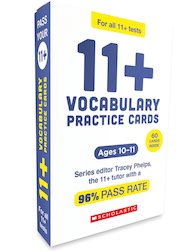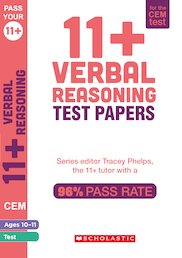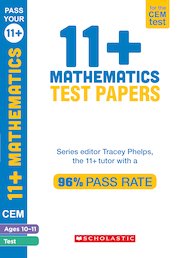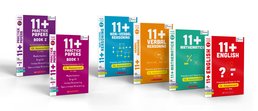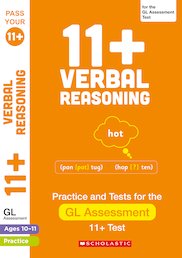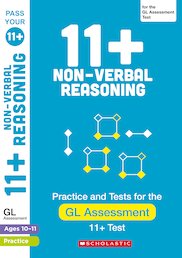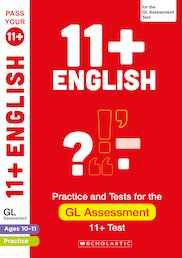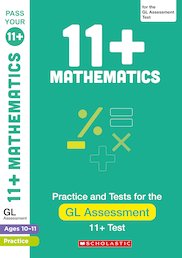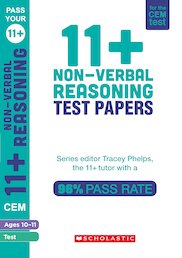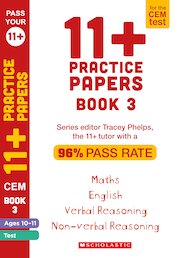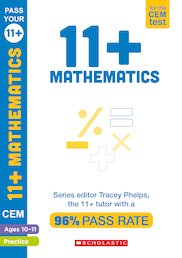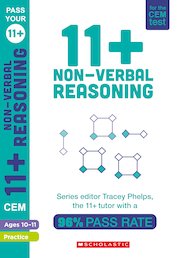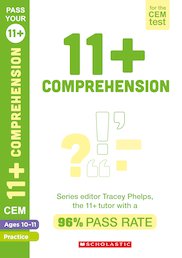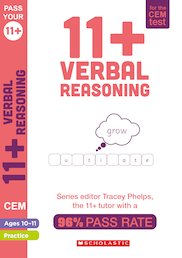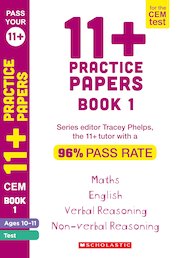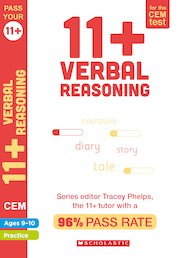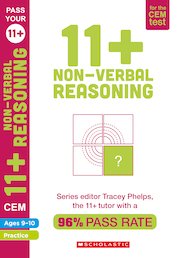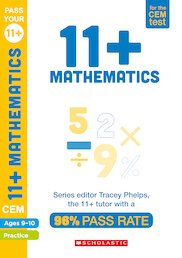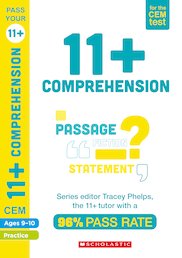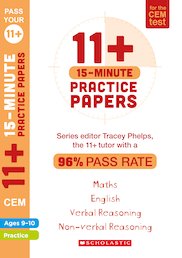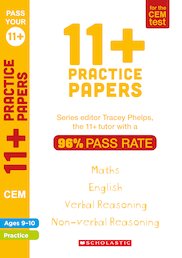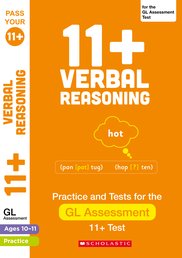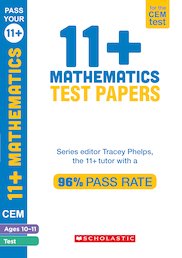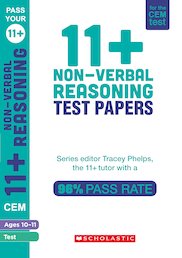11+ Tips for Parents - What Your Child Needs to Know
Pass Your 11+ series editor, Tracey Phelps is an established 11 Plus tutor based in the UK. The founder of 11 Plus Leap,” Tracey has helped hundreds of children (and parents!) prepare for the CEM 11 Plus exam. Below are Tracey’s top tips to help parents prepare their child for the 11 Plus, including what key topics and skills the exam will cover.
How to help your child prepare – select year group:Tips for Preparing for the 11 Plus exam – Year 4
As part of the long-term strategy, and from an early age, I would strongly recommend encouraging your child to read. I believe that this advice applies to every child, whether they are hoping to go to grammar school or not, but it becomes especially important with regard to the 11 Plus.
Reading allows your child to expand his or her vocabulary beyond the typical range of topics; as the old adage goes, reading truly does broaden the mind. In general, it is better to allow your child to choose his or her own reading material, as it will ultimately become frustrating if they come to see reading as a chore.
I encourage all the parents I work with to play word games on the school run, and make learning entertaining through using engaging workbooks.
As a rule, I don’t advise on making the sessions too arduous. Try to make learning fun and sit with your child whilst they work.
Ensure tuition and learning times suit your child; aim for a time when they are not tired or over excited about some activity that they might be doing later in the day.
Create a positive learning environment by getting into a routine where children actively want to learn. Too much pressure and not enough encouragement may mean children view 11 Plus practice as a chore.
Switch up learning by using different methods or short diversions to help embed learning and make practice less monotonous.
Year 4 – what to teach:
Maths
Try to resist the temptation to ‘overrule’ your child when examining different methods with which to tackle the basic operations in maths; they will have been taught differently in their primary school and it is better to try and understand how they arrive at their answers, rather than try to impose a method that you were taught!
Students should have solid skills in the following:- Place value, square and cube numbers.
- Roots, prime numbers, and factors.
- Fractions: finding fractions of amounts, equivalent fractions, simplifying fractions, proper fractions, improper fractions, mixed numbers, adding, subtracting, multiplying, and dividing fractions.
- Time: analogue, digital, 12-hour, 24- hour, world time zones.
- Decimals, fractions, and percentages: rounding to a given number of decimal places.
- Money: our coinage system, currency conversion.
- Measurement: metric units of length, mass, and capacity.
- Area and perimeter: compound shapes, surface area and volume.
- Mean, median, mode and range.
- Ratio and probability, scale.
- Angles, shapes, compass points, symmetry
English
The CEM 11+ exam places a big emphasis on comprehension. This mean your child’s comprehension skills need to be excellent. I’ve found that some children don’t enjoy comprehension practice because at school, they will typically be exposed to the type of comprehension where they will have to answer the questions with complete sentences.
CEM 11+ comprehension questions are multiple-choice so one way to tackle your child’s reluctance is to impress upon them that they will not have to write much! The key to success in comprehension is to find a subject that your child might find interesting, try making up your own comprehension activities – for example if you have a football mad son, copy and adapt a match report from a newspaper and think up some questions yourself.
Non-Verbal Reasoning
Be sure to test your child’s ability in the Non-Verbal Reasoning (NVR) component as early as possible. Whilst it is generally the case that a mathematical brain will be able to process NVR easily, this is not always the case and therefore any weaknesses should be addressed earlier rather than later.
Tips for Preparing for the 11 Plus exam – Year 5
- Begin to introduce Jumbled Sentences and Cloze passages into your child’s study program.
- Encourage your child to read widely, there is truly no better way to improve vocabulary than to have a love of reading and to explore unfamiliar words
- About half-way through year 5 is an ideal time to start to work on full length practice papers. At this stage, time management should not be a factor and children should concentrate on accuracy rather than speed.
- Begin to concentrate on building up speed during the summer of Year 5.
- Practice using shorter papers to build confidence and speed and consolidate skills learned
CEM 11+ Practice Resouces
See more CEM 11+ Practice Resouces-
 Pass Your 11+: Vocabulary Flashcards
Pass Your 11+: Vocabulary Flashcards
- gbp prices
- Offer price: £6.30
- Rewards/RRP: £6.99
-
 Pass Your 11+: 11+ Verbal Reasoning Tests Ages 10-11
Pass Your 11+: 11+ Verbal Reasoning Tests Ages 10-11
- gbp prices
- Offer price: £6.30
- Rewards/RRP: £6.99
-
 Pass Your 11+: 11+ Mathematics Tests Ages 10-11
Pass Your 11+: 11+ Mathematics Tests Ages 10-11
- gbp prices
- Offer price: £6.30
- Rewards/RRP: £6.99
-

6books
Pass Your 11+ GL Assessment Ultimate Revision Bundle- gbp prices
- Offer price: £37.00
- Rewards/RRP: £41.94
-
 Pass Your 11+: 11+ Verbal Reasoning Practice and Test for the GL Assessment Ages 10-11
Pass Your 11+: 11+ Verbal Reasoning Practice and Test for the GL Assessment Ages 10-11
- gbp prices
- Offer price: £6.30
- Rewards/RRP: £6.99
-
 Pass Your 11+: 11+ Non-verbal Reasoning Practice and Test for the GL Assessment Ages 10-11
Pass Your 11+: 11+ Non-verbal Reasoning Practice and Test for the GL Assessment Ages 10-11
Award-winning author
- gbp prices
- Offer price: £6.30
- Rewards/RRP: £6.99
-
 Pass Your 11+: 11+ English Practice and Test for the GL Assessment Ages 10-11
Pass Your 11+: 11+ English Practice and Test for the GL Assessment Ages 10-11
- gbp prices
- Offer price: £6.30
- Rewards/RRP: £6.99
-
 Pass Your 11+: 11+ Maths Practice and Test for the GL Assessment Ages 10-11
Pass Your 11+: 11+ Maths Practice and Test for the GL Assessment Ages 10-11
Award-winning author
- gbp prices
- Offer price: £6.30
- Rewards/RRP: £6.99
-
 Pass Your 11+: 11+ Practice Papers for the GL Assessment Ages 10-11 - Book 2
Pass Your 11+: 11+ Practice Papers for the GL Assessment Ages 10-11 - Book 2
Award-winning author
- gbp prices
- Offer price: £6.30
- Rewards/RRP: £6.99
-
 Pass Your 11+: 11+ Practice Papers for the GL Assessment Ages 10-11 - Book 1
Pass Your 11+: 11+ Practice Papers for the GL Assessment Ages 10-11 - Book 1
Award-winning author
- gbp prices
- Offer price: £6.30
- Rewards/RRP: £6.99
-
 Pass Your 11+: 11+ Non-Verbal Reasoning Tests Ages 10-11
Pass Your 11+: 11+ Non-Verbal Reasoning Tests Ages 10-11
- gbp prices
- Offer price: £6.30
- Rewards/RRP: £6.99
-
 Pass Your 11+: 11+ Practice Papers for the CEM Test Ages 10-11 - Book 2
Pass Your 11+: 11+ Practice Papers for the CEM Test Ages 10-11 - Book 2
- gbp prices
- Offer price: £6.30
- Rewards/RRP: £6.99
-
 Pass Your 11+: 11+ Practice Papers for the CEM Test Ages 10-11 - Book 3
Pass Your 11+: 11+ Practice Papers for the CEM Test Ages 10-11 - Book 3
- gbp prices
- Offer price: £6.30
- Rewards/RRP: £6.99
-
 Pass Your 11+: 11+ Mathematics Practice and Assessment for the CEM Test Ages 10-11
Pass Your 11+: 11+ Mathematics Practice and Assessment for the CEM Test Ages 10-11
- gbp prices
- Offer price: £6.30
- Rewards/RRP: £6.99
-
 Pass Your 11+: 11+ Non-Verbal Reasoning Practice and Assessment for the CEM Test Ages 10-11
Pass Your 11+: 11+ Non-Verbal Reasoning Practice and Assessment for the CEM Test Ages 10-11
- gbp prices
- Offer price: £6.30
- Rewards/RRP: £6.99
-
 Pass Your 11+: 11+ English Comprehension Practice and Assessment for the CEM Test Ages 10-11
Pass Your 11+: 11+ English Comprehension Practice and Assessment for the CEM Test Ages 10-11
- gbp prices
- Offer price: £6.30
- Rewards/RRP: £6.99
-
 Pass Your 11+: 11+ Verbal Reasoning Practice and Assessment for the CEM Test Ages 10-11
Pass Your 11+: 11+ Verbal Reasoning Practice and Assessment for the CEM Test Ages 10-11
- gbp prices
- Offer price: £6.30
- Rewards/RRP: £6.99
-
 Pass Your 11+: 11+ Practice Papers for the CEM Test Ages 10-11 - Book 1
Pass Your 11+: 11+ Practice Papers for the CEM Test Ages 10-11 - Book 1
- gbp prices
- Offer price: £6.30
- Rewards/RRP: £6.99
-
 Pass Your 11+: 11+ 15-Minute Practice Papers for the CEM Test Ages 10-11
Pass Your 11+: 11+ 15-Minute Practice Papers for the CEM Test Ages 10-11
- gbp prices
- Offer price: £6.30
- Rewards/RRP: £6.99
-
 Pass Your 11+: 11+ Verbal Reasoning Practice and Assessment for the CEM Test Ages 9-10
Pass Your 11+: 11+ Verbal Reasoning Practice and Assessment for the CEM Test Ages 9-10
- gbp prices
- Offer price: £6.30
- Rewards/RRP: £6.99
-
 Pass Your 11+: 11+ Non-Verbal Reasoning Practice and Assessment for the CEM Test Ages 9-10
Pass Your 11+: 11+ Non-Verbal Reasoning Practice and Assessment for the CEM Test Ages 9-10
- gbp prices
- Offer price: £6.30
- Rewards/RRP: £6.99
-
 Pass Your 11+: 11+ Mathematics Practice and Assessment for the CEM Test Ages 9-10
Pass Your 11+: 11+ Mathematics Practice and Assessment for the CEM Test Ages 9-10
- gbp prices
- Offer price: £6.30
- Rewards/RRP: £6.99
-
 Pass Your 11+: 11+ English Comprehension Practice and Assessment for the CEM Test Ages 9-10
Pass Your 11+: 11+ English Comprehension Practice and Assessment for the CEM Test Ages 9-10
- gbp prices
- Offer price: £6.30
- Rewards/RRP: £6.99
-
 Pass Your 11+: 11+ 15-Minute Practice Papers for the CEM Test Ages 9-10
Pass Your 11+: 11+ 15-Minute Practice Papers for the CEM Test Ages 9-10
- gbp prices
- Offer price: £6.30
- Rewards/RRP: £6.99
-
 Pass Your 11+: 11+ Practice Papers for the CEM Test Ages 9-10
Pass Your 11+: 11+ Practice Papers for the CEM Test Ages 9-10
- gbp prices
- Offer price: £6.30
- Rewards/RRP: £6.99
-

6copies
11+ VR GL 10-11 PB x6- gbp prices
- Offer price: £33.55
- Rewards/RRP: £41.94
-

6copies
11+Non-VR GL 10-11 PB x6- gbp prices
- Offer price: £33.55
- Rewards/RRP: £41.94
-

6copies
11+ Maths Tests Ages 10-11 x6- gbp prices
- Offer price: £33.55
- Rewards/RRP: £41.94
-

6copies
11+ Non Verbal Reasoning x6- gbp prices
- Offer price: £33.55
- Rewards/RRP: £41.94
-

6copies
11+ Verbal Reasoning Test x6- gbp prices
- Offer price: £33.55
- Rewards/RRP: £41.94

